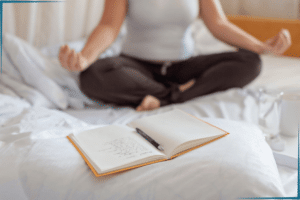Creating and sticking to healthy sleep habits is foundational for your health and wellness. Quality sleep is key to how we function day-to-day and can reduce the risk of long-term health issues. Better sleep habits can transform your life by improving focus, mood, and energy.
Daily habits can significantly impact your sleep quality. The choices you make around sleep hygiene can either support restful sleep or, conversely, lead to disruptions.
In today’s world of demanding work schedules, getting the recommended seven to nine hours of sleep each night is challenging yet crucial. According to the National Sleep Foundation, improving sleep quality should be a priority. By committing to better sleep, you’re investing in your health and longevity.
Below, find ten practical tips that can help you build healthy sleep habits that support a better sleep routine and boost your overall well-being.
1. Stick to a Consistent Sleep Schedule
Keeping a regular sleep schedule is one of the most effective sleep habits for improving sleep quality.
Try setting a reminder to start winding down each night and avoid the urge to sleep in on weekends. Consistency is critical in establishing a healthy sleep routine.
2. Reduce Evening Stress
Limiting evening technology use can help you wind down and get better sleep. Blue light from devices like phones and computers disrupts the circadian rhythm and can delay sleep onset, harming sleep quality.
3. Develop a Calming Pre-Bed Routine
Creating a sleep-friendly evening routine can gently transition your body and mind into a restful state.
Engaging in calming activities, such as reading, listening to soothing music, or practicing breathing exercises, helps signal to your brain that it’s time to wind down.
In my experience, adding mindfulness practices or meditation to your evening routine can have profound benefits for sleep quality, especially when practiced regularly.
Apps like Headspace and Calm are great tools for guiding relaxation techniques, making it easier to establish a consistent, sleep-friendly routine that supports restful and rejuvenating sleep.

4. Optimize Your Sleep Environment
A cool, dark, and quiet room creates the ideal environment for sleep.
Blackout curtains can help block any ambient light, while a white noise machine or fan can help mask disruptive sounds.
In my experience as a sleep coach, even small changes—like removing clocks from view—can reduce the stress of clock-watching if you wake up at night.
Setting up a relaxing sleep environment is a vital part of establishing good sleep hygiene and signals to your body that it’s time to rest.
5. Avoid Caffeine and Alcohol After Noon
I’ve seen firsthand how caffeine and alcohol consumption in the hours before bed can disrupt sleep patterns.
Caffeine stays in your system longer than you might think, and while alcohol may initially make you drowsy, it can disturb your sleep later in the night, leading to more fragmented rest.
Shifting to decaf drinks and lighter evening meals allows your body to relax and prepares it for a restful night.
6. Limit Naps, Especially in the Afternoon
Napping can be a wonderful way to recharge, but timing and duration are key.
As I often advise my clients, if you feel the need for a nap, aim for no more than 20 minutes and avoid napping after 1 p.m.
Short, early naps can improve alertness without interfering with nighttime sleep, whereas longer naps, especially in the late afternoon, can delay your sleep-wake cycle and make it harder to fall asleep at night.
7. Get Up if You Can’t Sleep
If you find yourself lying awake for more than 20 minutes, it’s best to get out of bed.
From my perspective as a sleep coach, this helps prevent negative associations with your bed, such as frustration and anxiety.
Instead, move to a quiet, dimly lit space, do something relaxing like light stretching or reading, and return to bed only when you feel truly sleepy. This practice reinforces the idea that your bed is a place for rest.

8. Skip Counting Sheep
Counting sheep may be a well-known trick, but research and experience show it can actually make it harder to fall asleep.
Instead, I recommend a visualization technique: picture a calm, familiar place and immerse yourself in it, imagining all the small details.
This mental journey can shift your focus from anxious thoughts, helping you drift off faster and promoting a more restful sleep.
9. Don’t Overreact to Occasional Sleep Issues
I remind my clients that occasional poor sleep is perfectly normal.
When you experience a bad night, try to avoid compensating by sleeping in, taking long naps, or going to bed earlier the next day, as these changes can disrupt your sleep schedule further.
Sticking to your regular routine is key to maintaining a healthy sleep pattern. If issues persist, though, it may be time to reach out for guidance.
10. Set Your Circadian Rhythm in the Morning
The foundation for a good night’s sleep begins as soon as you wake up.
Getting some natural light exposure in the morning, even just for a few minutes, can significantly help establish your circadian rhythm, which is your body’s internal clock.
I also encourage incorporating regular physical activity and keeping a consistent meal schedule. These habits send strong signals to your body, reinforcing a natural sleep-wake pattern that supports restorative sleep.
Conclusion
I’ve seen how following these tips and building consistent, healthy sleep habits can lead to profound improvements in sleep quality and overall well-being.
Quality sleep impacts everything from your mood and cognitive function to your immune system. If you’re still struggling with sleep despite these adjustments, consulting a sleep specialist could provide additional support.
For more tips and insights on improving sleep follow me on Instagram.
Explore my 1:1 support options, and let’s work together to create a personalized plan to help you improve your sleep and energy levels—so you can feel more rested and refreshed every day.

